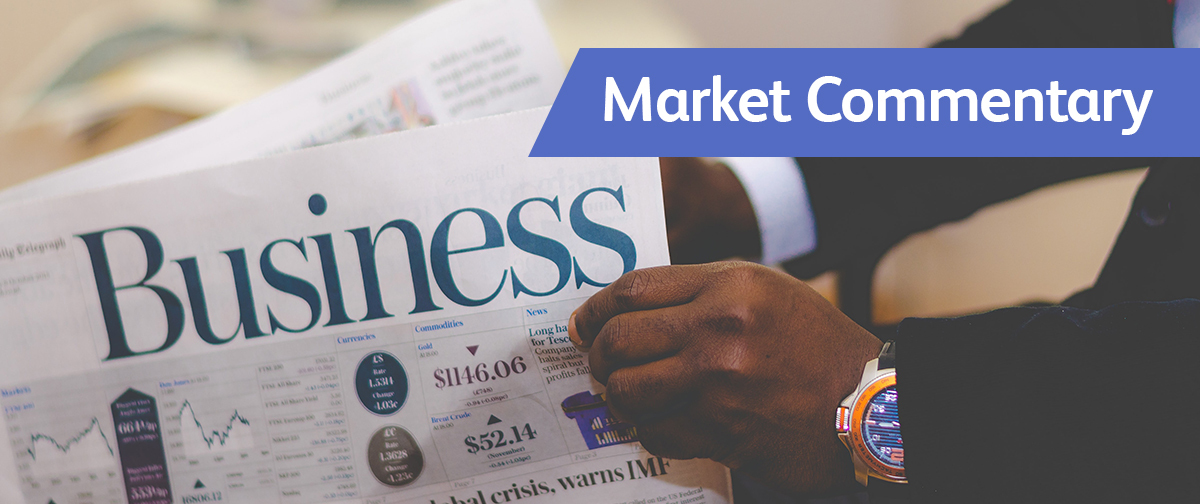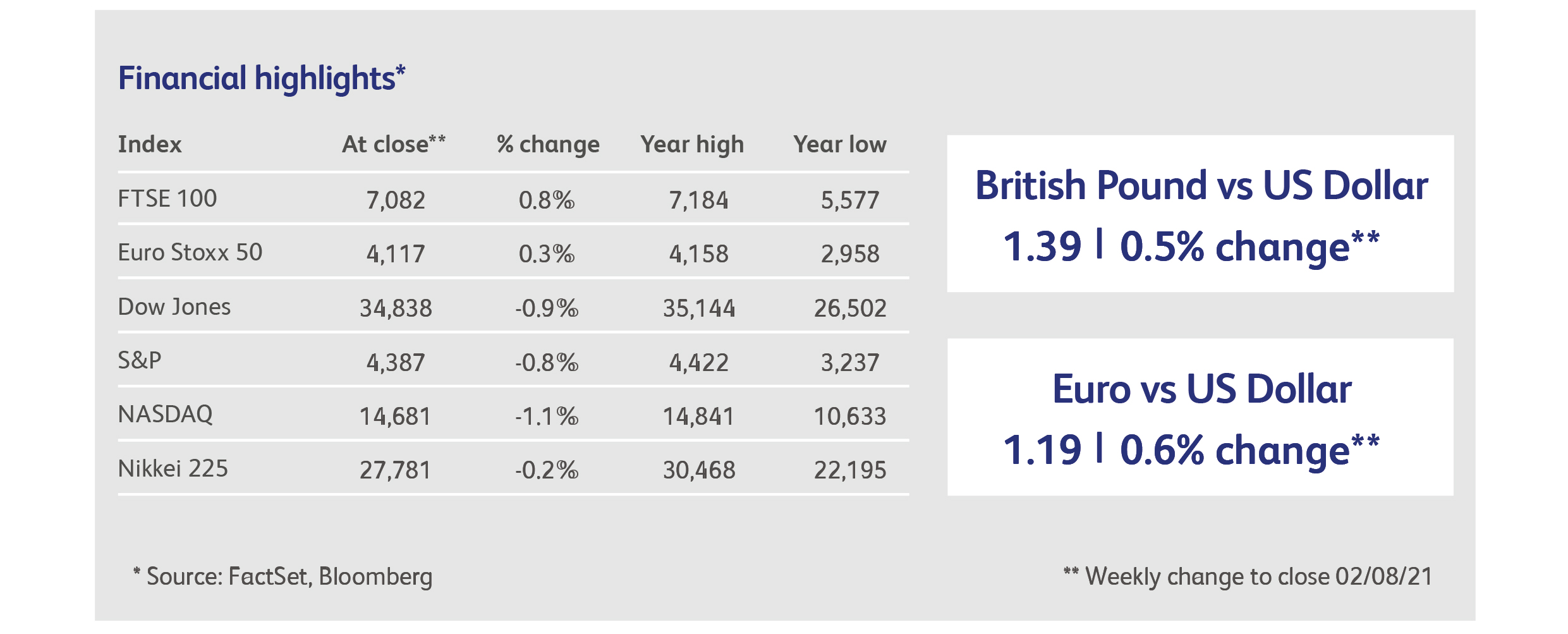
3 August 2021
It’s not often that staid bond markets are more exciting than animal-spirited stockmarkets but, while the western world’s equity markets have confidently bought every dip for the last nine months, the bond market has induced heart palpitations and head-scratching. Most recently, an unexpected rally in government bond values caught investors napping: during the month of July, for example, German government 10-year bonds rallied by the most since the start of the pandemic, sending yields well into negative territory. It’s a similar story across the rest of the developed world. This rally occurred despite economic growth roaring back and inflation, which reduces the purchasing power of bonds, surging towards its highs of the last two decades.
Why are investors seeking the safe haven of government bonds just as the economic rebound is nearing its zenith? As usual in capital markets, there is nothing like a sudden and unexpected move to generate a flurry of explanations, after the event. The default explanation is that rising bond prices – which means falling bond yields – indicate investors are worried about a slowdown in economic growth. While the delta variant of the coronavirus is the most likely cause of a slowdown in short-term growth, a deceleration in economic growth is also likely as the impact of the reopening wanes, and things return to normal. The impending removal of government stimulus will also reduce economic activity and, together, these factors could be enough to deflate the recovery and offset rising inflation.
Others look beyond the short-term and see growth slowing into the medium term. The cause is central banks which, in response to rebounding economic activity and rising inflation, have become more likely either to reduce their bond-buying programmes or to raise rates in the near future. In this dismal scenario, even a modest tightening of monetary conditions will be enough to cause a slowdown in longer-term growth. Adherents to this view point out that shorter-term bond yields have changed less than longer ones, suggesting that this is less about the delta variant and more about the long-term effects of changes in monetary policy. It’s relevant to note that, each time the US Federal Reserve bank tried to end Quantitative Easing programmes over the last decade, US bond yields ultimately fell as expectations for economic growth faded.
Yet another explanation focuses on technical factors: bond supply is low at the moment as the economic effects of the pandemic fade and government issuance begins to slow, while demand from central banks (still running at over $200 billion a month) is as high as ever. Moreover, speculators had recently positioned themselves for a sell-off due to inflation shocks, and had to hastily reverse their positions once it became apparent that central banks were not going to respond.
Whatever the reason, the fact remains that inflation has risen far faster than anyone expected, but bonds remain anchored. In the US, for example, inflation is now expected to average 3.8% for the current year, nearly double the expectation at the start of the year. But US 2-year government bonds only yield 0.2%. That’s great news for governments, who must surely be keen to see their debts eroded by inflation.

A mere three weeks after founder Jeff Bezos stepped aside as CEO at Amazon, the company’s second quarter results disappointed investors, failing to meet expectations for the first time since 2018. A slowdown in sales was to blame, as customers reverted to old habits like venturing outside the house. Investors sent the shares down about 8%, wiping out most of the gains for the year. But all is not lost: despite missing sales expectations, the company’s revenues had still managed to rise by 27% over the year-ago quarter, and profitability was much improved.
Most governments have stopped short of legally requiring citizens to be vaccinated, but corporate America has had enough of this laissez-faire approach. Walmart, the largest private employer in the US, is requiring headquarters and regional staff to be vaccinated by October 4th. Separately, Disney has given salaried staff 60 days in which to get vaccinated, and any new hires will only be given a job if fully vaccinated. The US’ largest law firms jumped on the bandwagon, telling employees they must be vaccinated before returning to the office.
The founder of Tesla wannabe Nikola Corp, maker of electric lorries, surrendered to police last week and is in custody, pending prosecution for making false and misleading statements to investors between November 2019 and September 2020. Among the whoppers allegedly told were that Nikola had actually built electric and hydrogen-powered lorries, and that the company was producing its own hydrogen. Nikola’s market value briefly exceeded Ford’s last year, but has fallen 85% from its peak.
HSBC cheered investors by reporting that profit for the second calendar quarter had doubled to $5.6 billion, beating analysts’ estimates of $4.7 billion. Bad debt provisions were cut, and dividend payments were resumed. The company expects to meet its target of paying out 40% to 55% of earnings in dividends this year.
Highlights
Real GDP in the Eurozone rose by 2% between the first and second calendar quarters, beating expectations. The year-over-year growth rate rebounded to 13.7%, from a lockdown-affected -1.3% in the first quarter. Southern Europe was the likely source of faster-than-expected growth, given the mildly disappointing growth in France and Germany.
Economic commentators were not phased by the poorer-than-expected US GDP data for the second calendar quarter, claiming that the post-pandemic rebound in consumer demand is still in place. The US economy expanded by 6.5% between the first and second quarters, well below expectations for growth of 8.4%, but the difference was mostly due to a surprising $80 billion plunge in inventory held by manufacturers, wholesalers and retailers. The reason for this is as yet unclear. The undoubted good news is that the US economy is now back above its pre-Covid size.
Calendar
The key US monthly employment report for July will shed more light on the strength of the recovery. Forecasters reigned in their expectations after recent reports underwhelmed expectations, and now expect that 900,000 jobs will have been created in July, up from 850,000 the previous month.
The Bank of England’s Monetary Policy Committee is expected to vote unanimously to keep the Bank Rate at 0.10%, and to maintain the target for government bond purchases at £875 billion by the end of the year. They will stick to the message that surging inflation will prove to be temporary and that downside risks to the economic outlook warrant continuing with the asset purchase programme, not least because the rise in delta variant infections in the wake of the European soccer championship has increased uncertainty about Britain’s economic recovery.
This publication is intended to be Walker Crips Investment Management’s own commentary on markets. It is not investment research and should not be construed as an offer or solicitation to buy, sell or trade in any of the investments, sectors or asset classes mentioned. The value of any investment and the income arising from it is not guaranteed and can fall as well as rise, so that you may not get back the amount you originally invested. Past performance is not a reliable indicator of future results. Movements in exchange rates can have an adverse effect on the value, price or income of any non-sterling denominated investment. Nothing in this document constitutes advice to undertake a transaction, and if you require professional advice you should contact your financial adviser or your usual contact at Walker Crips. Walker Crips Investment Management Limited is authorised and regulated by the Financial Conduct Authority and is a member of the London Stock Exchange. Registered office: Old Change House, 128 Queen Victoria Street, London, EC4V 4BJ. Registered in England number 4774117.
Important Note
No news or research content is a recommendation to deal. It is important to remember that the value of investments and the income from them can go down as well as up, so you could get back less than you invest. If you have any doubts about the suitability of any investment for your circumstances, you should contact your financial advisor.